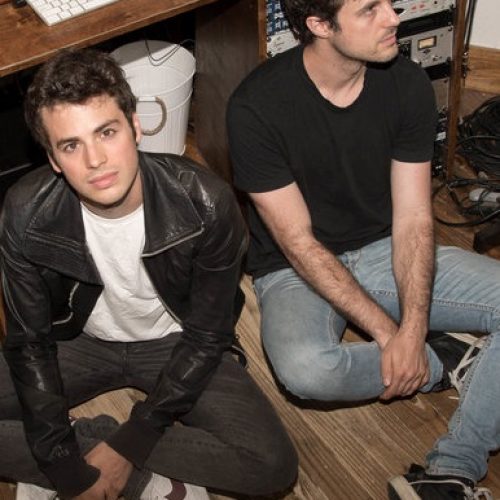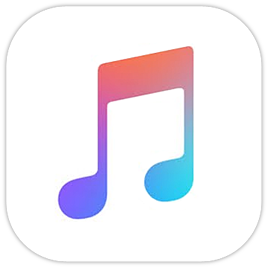I remember the exact moment that I first heard music from Eighty Ninety. I’d queued up a SoundCloud “Fresh Indie” playlist and was mindlessly letting it run through my headphones while I worked on something else.
Then, “Three Thirty” came on.
The song hooked me immediately. I stopped what I was doing, and I remember turning to my friend sitting next to me, taking out my headphones, and telling him to listen. We put it on the speakers in the room and agreed: “This song is going to be big.”
Not to brag too much (but also to brag a little bit) – we were right. Over the next few months, that song racked up millions of streams across platforms, and it’s currently sitting at 14.8 million on Spotify. Elizabeth, the following EP from the two brothers (Abner on vocals and production, and Harper on guitar and production), cemented Eighty Ninety’s status as one of my favorite-sounding artists.
And it was the sound that hooked me first. 808’s and telecasters, with acoustic guitars, delicate synths, lush but discrete production – it’s “bedroom arena,” which makes absolutely no sense until you hear the music. It’s smooth indie-electro pop that makes you want to belt out melodies with the windows down, and yet Abner’s vocals never lunge too far from of a whisper.
The lyric memories he’s singing fit, too. I read a review comparing “Three Thirty” to a Justin Bieber song; the analogy makes a fleeting bit of sense, but the subtlety and cohesiveness of the music steer Eighty Ninety into a unique sonic space.
That’s the secret, I think: cohesiveness. Abner and Harper know how to craft a complete song, one that hangs together from lyrics to sound in a way that strikes the right notes.
Today, a year and millions of plays later, I still snap out of whatever I’m doing when I hear Eighty Ninety. And I tend to hear them often, since I’ve nailed them to the top of a few of my favorite playlists.
This month, the band released their first single since that EP. It’s called “Your Favorite Song,” and it’s the sort of nostalgic, ear-catchingly chill pop that just might live up to it’s audacious name. Give it a listen and I bet you’ll find yourself humming along.
A big thanks to Abner and Harper for sharing the story behind the music. Here’s how they make things sound so good.
Give them a follow above, and check them out at a pretty slick new website, right here. And you can buy the new jam here.
When did you start writing songs?
Eighty Ninety: We were 11 or 12—mostly for our middle school punk bands.
What was your first song? What was it like?
Abner: Mine was called “You Left It Up To Me”. I was in fifth grade and I don’t remember anything but that — and the fact that once I had what I thought was a catchy guitar riff, I felt pretty much finished. I thought that a guitar hook was really all that mattered. I remember thinking, “well the hard part is over, if I can just bang out some words over a melody with the 3.5 chords I know, I should be good”.
Harper: Mine was about being alone in my room, angry at mom and dad. Which I think was, literally, a lyric in the song.
Your sound is the first thing that caught my ear; it’s a pretty unique blend. How did it come together?
As producers our instincts can lean toward pop but we grew up with a more analogue relationship to music, playing acoustic instruments and writing songs in notepads. I think our sound — what we call “808s and telecasters” — is what naturally came out when we decided to go for all of those things at once. As a result, you have drum machines and sampled hooks mixed with Nashville guitars and very personal lyrics.
Who are your influences?
We grew up listening to our parents’ records, so a lot of Tom Petty, Paul McCartney, Joshua Tree-era U2. Our songs definitely draw from that tradition — big choruses, widescreen universal themes, personal lyrics. In the last few years we’ve gotten more into classic american and americana music. So I think as a result there’s also a storytelling element to a lot of the songs.
Why do you write songs?
Keeping a journal is a good way to sort through emotions. But putting words to music — choosing how you’re going to express those feelings, what the arc of the melody looks like, which precise words to use — really makes you articulate them. You learn things about how you actually feel when you write a song.
What’s your favorite song that you’ve written?
We write a lot more songs than we record, and we record a lot more than we release. If we put out a song as Eighty Ninety — if a song makes it to that point — it’s definitely one of our favorites. That said, “Three Thirty” was the first song we made as Eighty Ninety and it helped solidify our style and approach and exposed us to a lot of new people. We have a special place in our hearts for that one.
What is your favorite song, and why?
It changes every day, but recently we were going through our Spotify time-capsule playlist and decided that One Headlight (The Wallflowers) is a perfect recording of a perfect song. The lyrics, production, melodies, and harmony all tell different layers of the same story, and it’s a nuanced but incredibly powerful one.
What go you think makes music or a song good?
If you’re honest about real feelings and experiences (even in an abstract way) and are willing to go deep with them — to take emotional risks — you have a good song.
How do you write? Do you start with lyrics, or with melody?
Abner: Usually I start by trying to meditate for a minute and just see what I naturally begin thinking about. That’s a good way to know what I need to work through. Then I grab a guitar and just start playing, humming phrases. I don’t overthink it. Sometimes something comes and sometimes it doesn’t. But it always feels good. So really, I just try to create space for a song to come up if there’s one that’s waiting to come up.
Harper: If I’m having trouble writing a song it’s usually about the emotional headspace I’m in, not a lack of musical ideas. You can always do something that sounds OK, the question is where is it coming from and does it really need to be expressed?
How do you write a melody?
For us it’s not about writing a “good” melody — that’s subjective. It’s about writing a melody that resonates with the emotion of the song. So just like picking the right words, you’re trying to pick the right notes. For us it’s important that the melody, the words, the chords and the production all support the song’s emotional core.
Do the two of you co-write? Who writes which parts?
Every song is different — but we’re always both involved in every stage of a track, from songwriting to production and mixing, in one way or another.
Your songs tend to feel really personal. Why do you choose that route over more general themes, and how do you think it affects listeners?
It’s less of a choice and more about how we naturally process and channel our lives into our music. Our songs tend to explore pretty universal themes — memory, love, time, loss — through a very personal perspective. The hope is that people will recognize themselves in the specificity of the lyrics. Even though everyone’s life is totally unique, we share the same kinds of details, connections, and experiences.
Do you put more emphasis on lyrics or sound? And which would you consider more important?
We think it’s impossible to choose one over the other because each part of a song — lyrics, melody, harmony, production, even mixing — has a huge impact on every other part and fundamentally changes the impact of the whole. The sound determines how you experience and interpret the lyrics, and vice versa. We feel like people don’t experience these elements as separate things when they’re listening to a song. The feeling you get when you listen to a song isn’t a response to one particular facet, it’s a singular experience. So we try to put the emphasis on the overall emotional impact of the song, which means always considering the relationship between the lyrics and sound but not prioritizing one or the other. (Even if you’re just writing on an acoustic guitar, the same goes for lyrics vs. melody, harmony, arrangement, feel, etc.)
What emotions, thoughts, feelings do you want your music to inspire?
Abner: When I write a song I try to begin from a place of forgiveness — for myself or someone else (or both). I think coming from a place of empathy for everyone involved helps me to get a clearer perspective on how I really feel about something. Everyone is doing what they can to try and be happy. I like that once a song is out in the world, it can mean something different to everyone who listens. But that’s definitely in there.
Harper: Sometimes people talk about music in terms of escapism, but music helps me connect with emotions that I wouldn’t otherwise have an easy time connecting with. Hopefully it helps people go deeper with themselves and work through whatever feelings it brings up.
What role does production play in your writing?
Our songs are usually finished before we produce them — it’s important to us that they stand on their own. They can change as we produce the song out (sometimes you learn something about a lyric when you put a certain kick drum under it) but they’re generally in a relatively completed form when we hit record for the first time.
What advice would you give other songwriters?
We try not to make things up, just report on things we experience and feel. (It’s way easier that way and we like what we come up with more.)
What was the first part of this song to be written? Lyrics, melody, track?
Abner: The bones of “Your Favorite Song” were written on an acoustic guitar late at night. Usually a melodic phrase attached to a melody comes first. In this case it was “your favorite song on the radio / you know all the words”. That one central phrase quickly became a fractal of words, chords, and melodies that I tried to grab and piece together before they disappeared.
Is it about a personal experience? Would you be willing to share?
“Your Favorite Song” is about how a song can become totally inseparable from a person. Kind of like how certain scents carry you out of your life and back to a specific moment, person, or place in time — some songs I hear and I’m suddenly with that person again.
What’s your favorite line from the song?
The opening one: “I can picture you / still standing there / with your favorite jean jacket / and your movie stare”. It describes exactly what happened when I started writing: I could suddenly picture it. The memory was there, and clear. Everything that followed came from that moment.
The music vibe seems more upbeat than the songs on Elizabeth, but the lyrics have the same bittersweet feel. How did you work to blend those two feelings?
With “Your Favorite Song” the sadness or nostalgia mainly comes from the fact that something is over, a person is gone — but it is, overall, a happy memory. A lot of Elizabeth deals with things from the past that were difficult as they were happening— and so the hopefulness came from an attempt to come to terms with those difficult experiences and relationships. “Your Favorite Song” remembers the good times, too.
What do you want listeners to take away from this song?
We hope it makes people smile, dance and cry (the good kind).
When did you know the song was finished? How long did production take?
We usually have three or four songs going at once and will jump between sessions depending on the vibe in the studio that day, so it’s hard to say exactly how long the production took for “Your Favorite Song”. But we got the basics down pretty quickly — the acoustic, drums, and pads — and took our time with the details. We really wanted to make sure every moment we created was not just ear candy, but reflected a lyric or emotional beat in the song.
Can you share any details on the recording and production process?
It’s a personal, intimate song, and a main priority when we were producing it out was to make sure that we didn’t distract from that with an extravagant production. The idea is that there’s a fun, summer, listening-to-your-favorite-song-in-the-car vibe but there’s also this sweet, nostalgic element with the lyrics. We wanted it to feel like a dance song, but one that you would play on a boombox sitting on a bed next to the person you love or in a car with the windows down. Somewhere in between a dance song and a lullaby. We tracked the acoustic guitar and vocals first, and then built the production around those core elements. We wanted the production to kind of sneak in and help lift you into that hazy space “in between / a memory and a dream”, to quote Tom Petty.
What’s next for you guys in terms of shows / album release date?
“Your Favorite Song” is the first single off of our upcoming EP, Bowery Beach Road. We’re going to be putting out a lot of music this fall as well as playing some shows. No official date announcements yet — but stay tuned.













